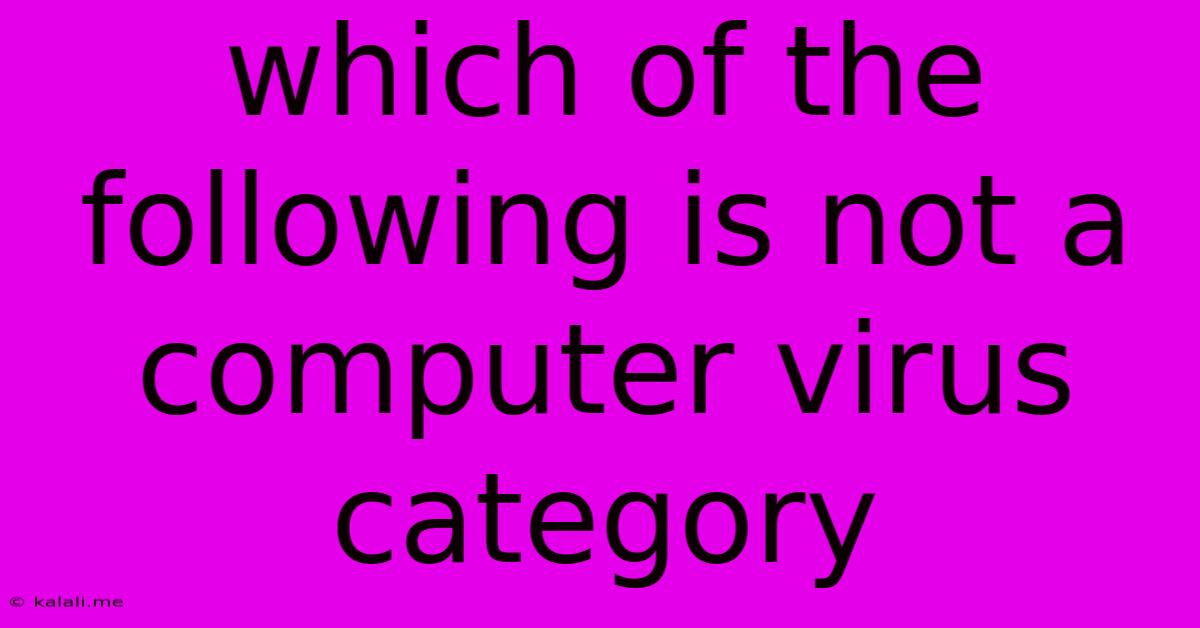Which Of The Following Is Not A Computer Virus Category
Kalali
Jun 16, 2025 · 3 min read

Table of Contents
Which of the Following is NOT a Computer Virus Category? Understanding Malware Classifications
This article will delve into the world of computer viruses and malware, exploring common categories and clarifying which option from a hypothetical list does not belong. Understanding the different types of malware is crucial for protecting yourself and your data online. This guide will help you identify and understand the various threats.
Understanding Malware Categories: Before we identify the outlier, let's briefly review some common computer virus categories:
-
Boot Sector Viruses: These infect the boot sector of a hard drive, making them extremely dangerous as they can prevent the operating system from loading. They often spread through infected floppy disks (though less common now) or USB drives.
-
File Infector Viruses: These attach themselves to executable files (like .exe or .com files). When the infected file is executed, the virus runs, often spreading to other files on the system. They’re known for their ability to quickly replicate and spread.
-
Macro Viruses: These viruses reside within documents or other files that utilize macros – small programs embedded within documents (like Word or Excel files). They activate when the document is opened and can spread through email attachments or file sharing.
-
Polymorphic Viruses: These are particularly nasty because they change their code regularly, making them difficult to detect with traditional antivirus software. They employ encryption and code mutation techniques to evade detection.
-
Trojan Horses: While technically not strictly a virus, Trojans are a type of malware that often masquerades as legitimate software. They can perform malicious actions, such as stealing data, installing malware, or creating backdoors for attackers. They don't replicate themselves like viruses, but their destructive capabilities are significant.
-
Worms: Unlike viruses, which need to attach to a host file, worms spread independently across networks. They replicate themselves and consume system resources, potentially crippling networks.
The Missing Category (Hypothetical Example):
Let's consider a hypothetical multiple-choice question:
Which of the following is NOT a category of computer virus?
a) Boot Sector Virus b) File Infector Virus c) Spreadsheet Program d) Macro Virus e) Polymorphic Virus
The correct answer is c) Spreadsheet Program. A spreadsheet program (like Microsoft Excel or Google Sheets) is an application, not a type of computer virus. While a macro virus can reside within a spreadsheet, the spreadsheet itself is not a virus category.
Why Understanding Categories Matters:
Knowing the different types of computer viruses helps you understand how they operate and how to protect yourself. This knowledge informs your security practices, prompting you to:
- Use reputable antivirus software: Software that detects and removes various virus types is essential.
- Practice safe browsing habits: Avoid clicking on suspicious links or downloading files from untrusted sources.
- Keep your software updated: Regularly update your operating system and applications to patch security vulnerabilities.
- Back up your data: This protects you from data loss in case of infection.
By understanding the landscape of computer viruses and practicing safe computing habits, you can significantly reduce your risk of infection and protect your valuable data. Remember, staying informed is the first step toward online safety.
Latest Posts
Latest Posts
-
How To Create Clickable Image In Html
Jun 16, 2025
-
What Are The Factors Of 121
Jun 16, 2025
-
What Is A Theme Of The Passage
Jun 16, 2025
-
A Company That Provides Access To The Internet
Jun 16, 2025
-
Which Word Is Closest In Meaning To The Underlined Word
Jun 16, 2025
Related Post
Thank you for visiting our website which covers about Which Of The Following Is Not A Computer Virus Category . We hope the information provided has been useful to you. Feel free to contact us if you have any questions or need further assistance. See you next time and don't miss to bookmark.